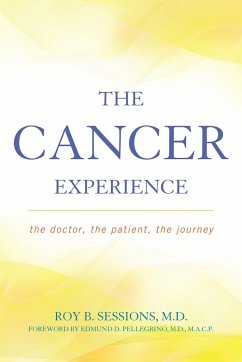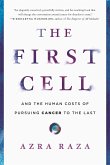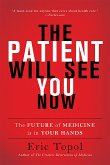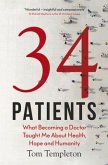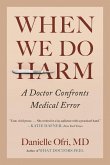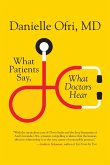- Gebundenes Buch
- Merkliste
- Auf die Merkliste
- Bewerten Bewerten
- Teilen
- Produkt teilen
- Produkterinnerung
- Produkterinnerung
The Cancer Experience instructs doctors, medical students, and health care workers involved in cancer care on the proper role of medicine, the role of doctors, and the opportunities for connecting with patients as they make treatment and end of life decisions. It helps patients understand the issues facing doctors as they assist and care for them.
Andere Kunden interessierten sich auch für
![Love, Fear, and Health Love, Fear, and Health]() Robert MaunderLove, Fear, and Health45,99 €
Robert MaunderLove, Fear, and Health45,99 €![The First Cell The First Cell]() Azra RazaThe First Cell22,99 €
Azra RazaThe First Cell22,99 €![The Customer Revolution in Healthcare The Customer Revolution in Healthcare]() David JohnsonThe Customer Revolution in Healthcare24,99 €
David JohnsonThe Customer Revolution in Healthcare24,99 €![The Patient Will See You Now The Patient Will See You Now]() Topol, Eric, M.D.The Patient Will See You Now23,99 €
Topol, Eric, M.D.The Patient Will See You Now23,99 €![34 Patients: The Profound and Uplifting Memoir about the Patients Who Changed One Doctor's Life 34 Patients: The Profound and Uplifting Memoir about the Patients Who Changed One Doctor's Life]() Tom Templeton34 Patients: The Profound and Uplifting Memoir about the Patients Who Changed One Doctor's Life29,99 €
Tom Templeton34 Patients: The Profound and Uplifting Memoir about the Patients Who Changed One Doctor's Life29,99 €![When We Do Harm: A Doctor Confronts Medical Error When We Do Harm: A Doctor Confronts Medical Error]() Danielle OfriWhen We Do Harm: A Doctor Confronts Medical Error32,99 €
Danielle OfriWhen We Do Harm: A Doctor Confronts Medical Error32,99 €![What Patients Say, What Doctors Hear What Patients Say, What Doctors Hear]() M.D., Danielle Ofri,What Patients Say, What Doctors Hear22,99 €
M.D., Danielle Ofri,What Patients Say, What Doctors Hear22,99 €-
-
-
The Cancer Experience instructs doctors, medical students, and health care workers involved in cancer care on the proper role of medicine, the role of doctors, and the opportunities for connecting with patients as they make treatment and end of life decisions. It helps patients understand the issues facing doctors as they assist and care for them.
Produktdetails
- Produktdetails
- Verlag: Rowman & Littlefield
- Seitenzahl: 208
- Erscheinungstermin: 5. April 2012
- Englisch
- Abmessung: 230mm x 161mm x 21mm
- Gewicht: 456g
- ISBN-13: 9781442216211
- ISBN-10: 1442216212
- Artikelnr.: 35336210
- Herstellerkennzeichnung
- Libri GmbH
- Europaallee 1
- 36244 Bad Hersfeld
- gpsr@libri.de
- Verlag: Rowman & Littlefield
- Seitenzahl: 208
- Erscheinungstermin: 5. April 2012
- Englisch
- Abmessung: 230mm x 161mm x 21mm
- Gewicht: 456g
- ISBN-13: 9781442216211
- ISBN-10: 1442216212
- Artikelnr.: 35336210
- Herstellerkennzeichnung
- Libri GmbH
- Europaallee 1
- 36244 Bad Hersfeld
- gpsr@libri.de
Roy B. Sessions, M.D., retired from active practice in 2008 and is currently a Professor of Otolaryngology Head and Neck Surgery at The Medical University of South Carolina. During his almost 40 year career he is responsible for over 140 scientific publications, including 3 editions of Cancer Of The Head And Neck: A Multidisciplinary Approach (with Harrison and Hong). The first of these won the Doody International Medical Book of the Year Award among 4000 other textbooks. He has been associated with Sloan Kettering Cancer Center/Cornell Medical College and Beth Israel Cancer Center/Albert Einstein College of Medicine in New York City and served 10 years as the Chairman of the Department of Otolaryngology - Head and Neck Surgery at Georgetown University School of Medicine. During his academic career, he served as a consultant to the NCI, and was a member of the Editorial Board of their journal, the PDQ. Dr. Sessions has lectured extensively in the U.S. and internationally, including Germany, China, UK, Italy, France, Ecuador, Brazil, and Japan.
Author's Note on Terminology Foreword Acknowledgments Part I: Intellectual Considerations Prologue 1
Influences on My Development 2
Why the Book? 3
Protecting What's Good through the Educational Process: Capitalizing on the Gene Pool 4
Oncology Is Not for the Emotionally Stingy 5
Hope 6
Finding New Purpose after Enduring the Cancer Olympics 7
Changing Times, Changing Methods, Unchanging Mission 8
Seeking Functionality within a Moral Framework 9
A Practical Adaptation of the Original Oath in Search for Modern Relevance 10
Death and Dying: Natural and Otherwise 11
Suicide: Patient Conceived, Planned, and Consummated Part II: Interacting with Cancer Patients and Their Families 12
Informal Physician
Patient Communication 13
Patient Confidentiality and Special Patient Circumstances 14
Essentials of Communication Skills: Listening, Hearing, Reading Body Language 15
Gaining the Patient's Confidence 16
The Cancer Specialist as a Teacher of the Patient and Family: The Lead
Up to Treatment 17
The Physician as an Educator after Treatment: Using the Cancer as a Tool 18
The Journey from the Referring Doctor to the Oncologist: Uncertainty, Anxiety, and Hope along the Way 125 19
More on Physician Leadership: Being in Charge 20
Influences on Cancer Patients' Attitudes and Receptiveness 21
Communication When There Is Still Optimism for Cure 22
Communication Once Treatment Failure Is Obvious 23
Hospice Care 24
Facing Death and Dying with the Patient Epilogue Notes Bibliography Index About the Author
Influences on My Development 2
Why the Book? 3
Protecting What's Good through the Educational Process: Capitalizing on the Gene Pool 4
Oncology Is Not for the Emotionally Stingy 5
Hope 6
Finding New Purpose after Enduring the Cancer Olympics 7
Changing Times, Changing Methods, Unchanging Mission 8
Seeking Functionality within a Moral Framework 9
A Practical Adaptation of the Original Oath in Search for Modern Relevance 10
Death and Dying: Natural and Otherwise 11
Suicide: Patient Conceived, Planned, and Consummated Part II: Interacting with Cancer Patients and Their Families 12
Informal Physician
Patient Communication 13
Patient Confidentiality and Special Patient Circumstances 14
Essentials of Communication Skills: Listening, Hearing, Reading Body Language 15
Gaining the Patient's Confidence 16
The Cancer Specialist as a Teacher of the Patient and Family: The Lead
Up to Treatment 17
The Physician as an Educator after Treatment: Using the Cancer as a Tool 18
The Journey from the Referring Doctor to the Oncologist: Uncertainty, Anxiety, and Hope along the Way 125 19
More on Physician Leadership: Being in Charge 20
Influences on Cancer Patients' Attitudes and Receptiveness 21
Communication When There Is Still Optimism for Cure 22
Communication Once Treatment Failure Is Obvious 23
Hospice Care 24
Facing Death and Dying with the Patient Epilogue Notes Bibliography Index About the Author
Author's Note on Terminology Foreword Acknowledgments Part I: Intellectual Considerations Prologue 1
Influences on My Development 2
Why the Book? 3
Protecting What's Good through the Educational Process: Capitalizing on the Gene Pool 4
Oncology Is Not for the Emotionally Stingy 5
Hope 6
Finding New Purpose after Enduring the Cancer Olympics 7
Changing Times, Changing Methods, Unchanging Mission 8
Seeking Functionality within a Moral Framework 9
A Practical Adaptation of the Original Oath in Search for Modern Relevance 10
Death and Dying: Natural and Otherwise 11
Suicide: Patient Conceived, Planned, and Consummated Part II: Interacting with Cancer Patients and Their Families 12
Informal Physician
Patient Communication 13
Patient Confidentiality and Special Patient Circumstances 14
Essentials of Communication Skills: Listening, Hearing, Reading Body Language 15
Gaining the Patient's Confidence 16
The Cancer Specialist as a Teacher of the Patient and Family: The Lead
Up to Treatment 17
The Physician as an Educator after Treatment: Using the Cancer as a Tool 18
The Journey from the Referring Doctor to the Oncologist: Uncertainty, Anxiety, and Hope along the Way 125 19
More on Physician Leadership: Being in Charge 20
Influences on Cancer Patients' Attitudes and Receptiveness 21
Communication When There Is Still Optimism for Cure 22
Communication Once Treatment Failure Is Obvious 23
Hospice Care 24
Facing Death and Dying with the Patient Epilogue Notes Bibliography Index About the Author
Influences on My Development 2
Why the Book? 3
Protecting What's Good through the Educational Process: Capitalizing on the Gene Pool 4
Oncology Is Not for the Emotionally Stingy 5
Hope 6
Finding New Purpose after Enduring the Cancer Olympics 7
Changing Times, Changing Methods, Unchanging Mission 8
Seeking Functionality within a Moral Framework 9
A Practical Adaptation of the Original Oath in Search for Modern Relevance 10
Death and Dying: Natural and Otherwise 11
Suicide: Patient Conceived, Planned, and Consummated Part II: Interacting with Cancer Patients and Their Families 12
Informal Physician
Patient Communication 13
Patient Confidentiality and Special Patient Circumstances 14
Essentials of Communication Skills: Listening, Hearing, Reading Body Language 15
Gaining the Patient's Confidence 16
The Cancer Specialist as a Teacher of the Patient and Family: The Lead
Up to Treatment 17
The Physician as an Educator after Treatment: Using the Cancer as a Tool 18
The Journey from the Referring Doctor to the Oncologist: Uncertainty, Anxiety, and Hope along the Way 125 19
More on Physician Leadership: Being in Charge 20
Influences on Cancer Patients' Attitudes and Receptiveness 21
Communication When There Is Still Optimism for Cure 22
Communication Once Treatment Failure Is Obvious 23
Hospice Care 24
Facing Death and Dying with the Patient Epilogue Notes Bibliography Index About the Author

